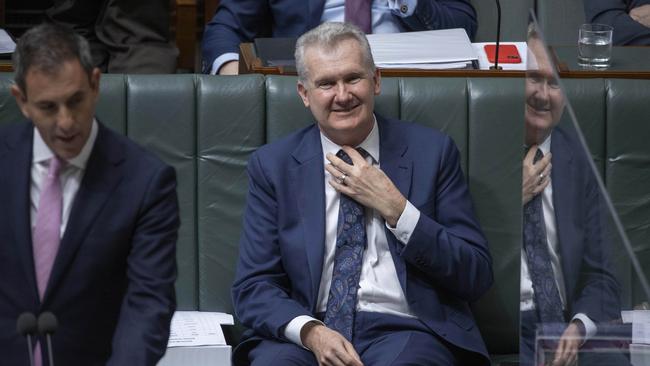Devil’s in the detail of Labor’s rushed IR reform bill
The Albanese government wants you to believe wages have been deliberately kept low for years. If true, it happened under laws set up by Labor. Where has common sense gone?

For some time, Labor types have been telling us all that for the past 10 years, wages have been deliberately kept low. If this is true, then the cabal of unidentified operatives who busied themselves deliberately keeping wages low for the entire country were keeping them there under Labor’s wages system, a system designed to actually send wages higher.
The Fair Work Act of 2009 was a Labor reform and it was meant to provide for higher wages growth, greater productivity, and increased workplace harmony. It marked the pinnacle of modern Labor, and the conclusion of a process that began in the 1980s.
Back in 1982, unemployment had reached 9.4 per cent, inflation was at 12.4 per cent and two million working days had been lost to industrial disputes.
A decade later, Bill Kelty, the ACTU secretary, spoke of his long-term strategy, beginning with wage restraint, restructuring awards, and then implementing enterprise-level reforms. The Industrial Relations Reform Bill of 1993 was all about bargaining at the workplace rather than arbitrated outcomes for industry.
Well over a decade later, when the Fair Work Act was designed, the drafters had sincere hopes for good outcomes. From all sides of the equation they collaborated well, beavering away for months and months, consulting, changing and amending until all stakeholders could live with the final draft. The system wasn’t perfect, no one got everything they wanted, but everyone got something.
Back then, Labor’s appointed experts created a system centred around single-enterprise bargaining, built on the principal of voluntary bargaining at the enterprise level. It allowed for multi-employer bargaining, but only in limited circumstances, perhaps because it was recognised that multi-employer bargaining can have a significant anti-competitive impact.
Now though, with unseemly haste, without proper consultation, in a reversal of wages theory and total disregard for the importance of competition, there has been an about-face and compulsory industry bargaining and tribunal arbitration could once again be imposed on Australian commerce.
To achieve final passage of the bill, a game of chicken is now being played between the government and the Senate, and it is thought that on the last day of the sitting year, the vote will be called.
I’m not here to argue for lower wages, but there are good reasons why this bill should fail to pass.
In summary, Part 21 of the bill is the problem. Forget clever talk about bargaining by multiple employers for one agreement remaining voluntary. We have tricky language being used here, and some are falling for it. The devil is in the detail of the greatly expanded “single interest employer authorisations” scheme. Part 21 of the bill takes both the “enterprise” and the “bargaining” out of enterprise bargaining, and the “agreement” out of an enterprise bargaining agreement.
Right now, businesses decide whether they want to employ staff under an enterprise agreement or an award. If they join the bargaining system, and pay employees under an agreement, they decide on the agreement’s terms and which parts of the business it covers. Employees vote to accept or reject the offer. Neither the workers nor the boss can be forced into an agreement.
Under the proposals in Part 21, unions can ask the Fair Work Commission to decide who is covered by agreements. One enterprise agreement could then be applied to cover multiple employers, without any of those employers’ consent.
Businesses could be forced into having the same agreement as their competitors, against their will. And different employers across an entire industry – or in a whole supply chain – could be subjected to protected industrial action all at once. Part 21 also means a large business with dozens of separate agreements for its different locations or divisions could have them all subsumed into a “single interest employer” agreement once they expire.
The process of bargaining for a single agreement covering multiple employers, or of employers arguing in the commission against the terms of another agreement being imposed upon them, means it could be difficult to reach consensus. Bargaining might take months, maybe years, while employees wait for their pay rise. It’s difficult to see competing businesses being happy about being forced to negotiate together, or accepting each other’s agreements.
To sum up, the bill provides for the creation of another award-like system on top of the existing one. This new second layer, which could deliver generic industry agreements, will also provide opportunities for unions to push for arrangements that generate side income streams for them. The system will probably be complicated, unwieldy and legalistic and might even slow down pay increases and/or result in lower wage growth.
Common sense needs to prevail, and the bill should be voted down, and people sent back to the drawing board.



With reportedly 150 last-minute amendments delivered in a mad scramble, Labor’s Secure Jobs, Better Pay bill sailed through the lower house of parliament. The detail of it, and the implications, could not possibly have been fully grasped by most who voted, but that doesn’t matter. It is about the vibe, you see. For too long, wages have been stagnating and industry bargaining is being held up as the best way to remedy the situation.